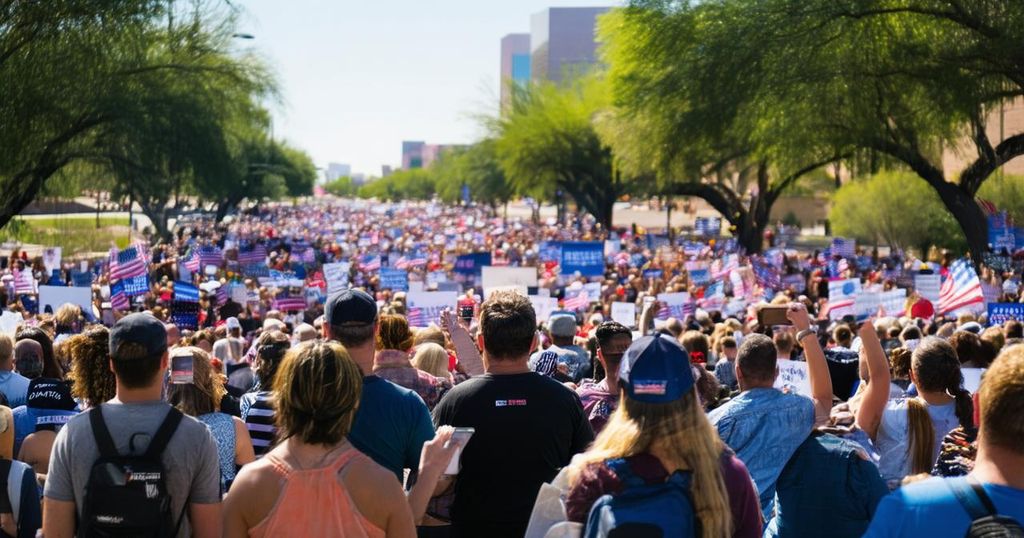Tensions Rise as Trump and Harris Campaign Ahead of Elections

With only twelve days until elections, Donald Trump heads to Arizona while Kamala Harris campaigns in Georgia alongside Barack Obama and Bruce Springsteen. Trump’s recent gaffe regarding President Biden raises concerns about age, amid ongoing debates about political rhetoric and Trump’s approach to policies. This competitive landscape underscores sensitive topics like fascism and the implications of both candidates’ political strategies as they prepare for crucial voter engagement.
As the political landscape approaches a crucial moment with only twelve days remaining until the elections, former President Donald Trump is set to travel to Arizona while Vice President Kamala Harris, alongside former President Barack Obama, campaigns for Democratic candidates in Georgia. Notably, musician Bruce Springsteen is slated to accompany Harris in Atlanta in light of the tight race underscored by recent polls. In a social media post, the Harris campaign highlighted a notable blunder from Trump during an interview, where he mistakenly attributed criticisms regarding the Middle East crisis to former President Obama instead of current President Joe Biden, prompting a Fox News host to correct him: “You mean President Biden.” This incident further amplifies the ongoing discourse about the former president’s age, particularly following Biden’s announcement to withdraw from the race citing age-related concerns after a poor debate performance earlier this year. In a related contest, Trump’s running mate has scheduled a rally in the Detroit suburb of Waterford, emphasizing Michigan’s significance as a battleground state. Trump recently visited Michigan, where he expressed his gratitude for the endorsement from the Yemeni-American mayor of Hamtramck. Conversely, Harris did not hesitate to criticize Trump following reports suggesting he made inappropriate comments regarding Adolf Hitler, labeling him as “unhinged and unstable.” Trump, during an interview, made headlines by threatening to dismiss Special Counsel Jack Smith if victorious in the November elections, asserting that he could easily terminate Smith within moments. The political narrative intensified with news of a man arrested in Phoenix, accused of shooting at the Democratic National Committee’s office, raising alarms over potential mass violence with his extensive arsenal of weapons. Congressman Eli Crane criticized Harris for her rhetoric, which he feels may incite further violence, asserting, “Kamala Harris continues to desperately deploy toxic rhetoric and appalling historical comparisons that will incite more hate and violence. All for power.” The ongoing debate concerning Trump’s characterization as a fascist, sparked by remarks from former General John Kelly and recent media coverage, has also become a focal point, prompting discussions about the implications of such labels in American politics. During a rally, Trump defended his stance on American exceptionalism, stating, “I will never apologise for defending America,” while Harris linked current geopolitical developments, advocating for a two-state solution in the ongoing Gaza conflict, and continuing to face criticism for U.S. support of Israel despite allegations of human rights violations. This tumultuous backdrop underscores the heightened tensions as both parties aim to solidify their support bases, with Trump’s narratives clashing against Harris’s positions on foreign policy and national security.
The current political climate in the United States is characterized by a highly competitive election cycle, with both major candidates focusing on pivotal battleground states. The tensions surrounding the campaigns reflect broader issues including age-related concerns for leadership, foreign policy decisions regarding the Middle East, and the ongoing debate about political rhetoric and its potential consequences in an increasingly polarized environment. With many citizens disillusioned with the political status quo, there is intense scrutiny on the rhetoric employed by both candidates, especially regarding sensitive topics such as fascism and historical comparisons to past leaders.
In conclusion, the convergence of political campaigns, remarks from veteran advisors, and recent events have set the stage for a crucial election in the United States. With Trump and Harris both harnessing the public discourse surrounding their positions, the outcomes of upcoming rallies and debates will play a significant role in shaping voter sentiment ahead of the elections. As both candidates navigate the complexities of their political narratives, the American electorate is faced with critical decisions that may determine the future course of the nation.
Original Source: www.aljazeera.com







